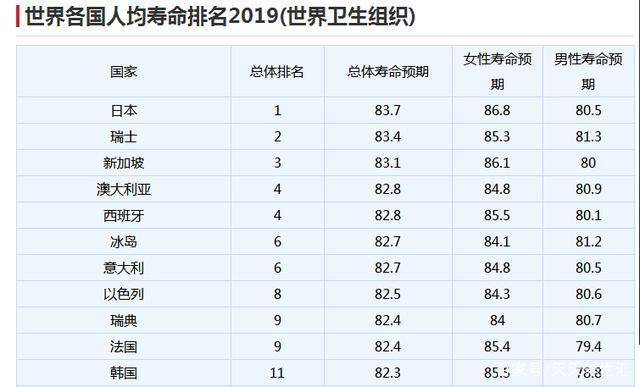The reasons behind the shorter male life expectancy compared to females, three reasons are changing, and the gap is narrowing.
According to the latest data released by the World Health Organization, in 2019, Japan still has the highest average life expectancy in the world. The male average life expectancy in Japan is 80.5 years, while for females, it is 86.8 years, resulting in a significant difference of 6.3 years. Following Japan is Switzerland, with males at 81.3 and females at 85.3, a 4-year difference.
China ranks 53rd, with males having an average life expectancy of 74.6 years and females 77.6 years, resulting in a 3-year difference between males and females.
Through comparison, it is found that the average age is positively correlated with the economic development of a country. Generally, countries or regions with better economic development tend to have longer life expectancies. It is also observed that regardless of the country, the average age of males is 3 to 10 years lower than that of females. The reasons behind this phenomenon are worth contemplating. Why is this so? Let’s delve into it together.
In theory, the natural lifespan of males should be longer than females.
Medical studies indicate that a person’s natural lifespan is related to the age of body development during puberty. It shows: “A person’s natural lifespan is 8-10 times that of the age of body development during puberty.” Based on this theory, let’s further explore.
Research shows that girls enter puberty at the age of 10-12. If a female enters puberty at the age of 12, then their natural lifespan should be between 96-120 years.
For males, puberty starts from 12-14. By taking the upper end, if a male starts developing at the age of 14, then his natural lifespan should be between 112-140 years. This means that the natural lifespan of males should be 16-20 years longer than that of females.
However, in reality, the average age of males in various countries is 3-5 years less than that of females, and in some cases, nearly 10 years less. Hence, this is a matter worth pondering.
Behind the lower average age of males compared to females, three reasons are worth considering.
Firstly, it is a matter of lifestyle habits.
Males tend to lead a more casual lifestyle, which leads to the adoption of many unhealthy habits like smoking, drinking alcohol, staying up late, excessive indulgence, and even the use of drugs, among others, typically associated with males.
Therefore, males tend to overdraw their bodies in life, losing the natural advantage of a strong body. While such negative habits may not show immediate effects on the body, prolonged indulgence can lead to health issues in middle age, often when it’s too late. Thus, this is an issue that males, especially the younger generation, should contemplate.
Secondly, it is the problem of excessive desires.
Currently, though people aren’t explicitly classified into categories, the possession of wealth and social status significantly influences people’s lives. Every male desires to “stand on the mountaintop.” However, excessive desires that are disproportionate to one’s wealth and social status can lead to exhaustion, carrying burdens, and immense life pressures, which can ultimately harm one’s health.
Thirdly, it is the difference in social roles.
Due to physiological differences, males and females have distinct social roles, evident in aspects like participation in war and undertaking high-risk occupations. Moreover, cultural ideologies like “gentlemanly behavior” and “machismo” further influence this. Customarily, in marriage, females receive whereas males give, reflecting age-old traditions.
Tasks involving danger, hardship, or difficulty are usually prioritized for men while easy and pleasant tasks are entrusted to women, leading to higher instances of health issues or accidents among men.
Certainly, in recent years, with the rising call for gender equality and the improving social status of women, women have taken up more family and social responsibilities. Consequently, the gap in the average lifespan between males and females is narrowing in recent years.
Therefore, could we consider that “in countries where gender equality is higher, the average age of males and females is closer, while in regions with high machismo, the age gap between males and females is wider?” This is a thought-provoking issue. How do you perceive this?


